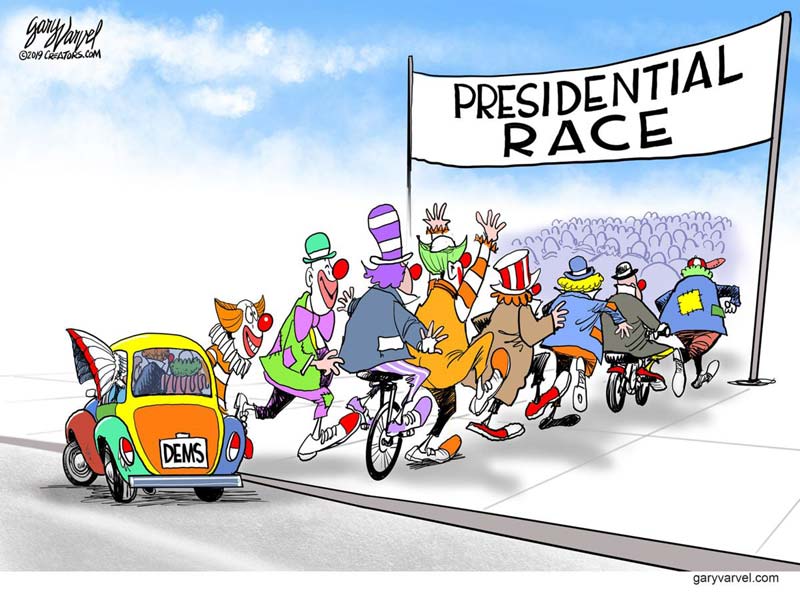
With Trump's base stubbornly loyal but stuck in the lower 40-percent range and the president seemingly uninterested in expanding it, Democrats and media see the billionaire as vulnerable in just 86 weeks.
The field of ambitious opposition wannabes is likely en route to exceeding the 16 Republicans who split the party's opposition to Trump in 2016.
Although a few such as former New York mayor Michael Bloomberg and Sen. Sherrod Brown faced reality and ruled out a run in such an impossibly splintered field, more are expected to announce, including the big donkey in the party's room, former Vice President Joe Biden.
Biden, who will turn 78 right after the 2020 election, has the luxury of name recognition after 36 years in the U.S. Senate and eight as vice president. But even for someone who dithers over such decisions, Biden's taking an unusually long time allegedly to decide on a run.
With the list of competitors growing and, more importantly, the ranks of aide talent signing on elsewhere, Biden recently began a vacation in the Virgin Islands. That's not a sign of the fire-in-the-belly ambition that typically fuels successful Oval Office quests.
After two failed White House bids, Biden could be genuinely uncertain, despite public reassurances from unidentified would-be aides. Or he could be having trouble getting long-term commitments from donors at a time in this primary campaign when dollars are far more important than votes.
That, for instance, is why Sen. Elizabeth Warren announced her candidacy on the unlikely occasion of New Year's Eve. It gives her the entire first quarter of 2019 to build a war chest, which she hopes will be so large as to scare off progressive challengers when the first numbers emerge in mid-April.
An additional consideration for Biden is the fact that his near-universal name recognition has a downside. It gives both Democrats and Republicans fully 44 years of public stands and statements to mine for missteps ripe for criticism.
Limited experience actually helped Barack Obama win the 2008 Democratic nomination when he had barely three years' worth of positions in the Senate. Besides a plethora of unpaid parking and traffic tickets, the only big thing Hillary Clinton's leakers could pin on him was his anti-American, anti-Semitic preacher, Jeremiah Wright.
Sen. Kamala Harris, one of the 2020 Democratic contenders, has barely two Senate years to peruse, while Sen. Cory Booker, another aspirant, is still in his first full term.
While still on the sidelines, Biden has consistently led polls of Democratic voters, who have fond recollections of Uncle Joe and short memories when it comes to his gaffes, including an assortment of obscenities, a plagiarism problem and wandering hands.
Biden's liberal credentials are unquestioned; he came out for gay marriage before his boss, Obama. However, if Biden enters the current fray, that could all change quickly in our fickle political culture, like last night's delicious pizza appearing unappealing this morning when warmed over.
Robert Gates, Obama's defense secretary, says Biden is impossible not to like, but wrong on just about every modern foreign policy issue. Biden, for example, was the lone cabinet dissenter on the raid to get Osama bin Laden.
"Times have changed," said Adam Green, a prominent progressive supporting Warren. "The center of gravity within the Democratic Party and the electorate overall has moved massively in a more populist direction."
Sen. Bernie Sanders is back, of course, making his convenient quadrennial shift from independent to Democrat.
Much as Trump's nontraditional policies have redefined Republican doctrine, a new generation of younger Democrats is steering their party toward a larger role for government. Think Medicare for All and the Green New Deal, among others.
The year's first wave of Democratic candidates was much further left than the party's recent presidents. The new crop of obstreperous freshman House members, some still in their twenties, is shoving the Democratic caucus in the same direction. And creating needless controversy over anti-Semitism.
This creates real political challenges for House Speaker Nancy Pelosi. Diversity is great, until you want people to get in line. She's less interested for now in ideological purity than in creating a record of Democratic achievements for the 2020 House and Senate elections.
Oh, look: The GOP had that same nettlesome unity problem with its tea party caucus nine years ago. Ask former Speaker John Boehner if that helped Republicans in the 2012 presidential election.
Next to join the cartoon cavalcade of candidates was ex-Gov. John Hickenlooper. Others will surely follow. Everyone will soundly denounce Trump. And they'll claim progressive credentials while arguing that their parallel pragmatism produces change.
"We need dreamers in Washington," Hickenlooper proclaimed, "but we also need to get things done."
Such divisive Democratic arguments will explode full volume on the crowded stage when party debates open in June before an international TV audience.
Political wisdom and experience suggest that despite media provocation, Republicans and President Trump should control their tongues and Twitter impulses and allow opponents to thoroughly and publicly bash each other without distraction.
(COMMENT, BELOW.)
Andrew Malcolm
McClatchy Washington Bureau
(TNS)
Malcolm is an author and veteran national and foreign correspondent covering politics since the 1960s.


 Contact The Editor
Contact The Editor
 Articles By This Author
Articles By This Author